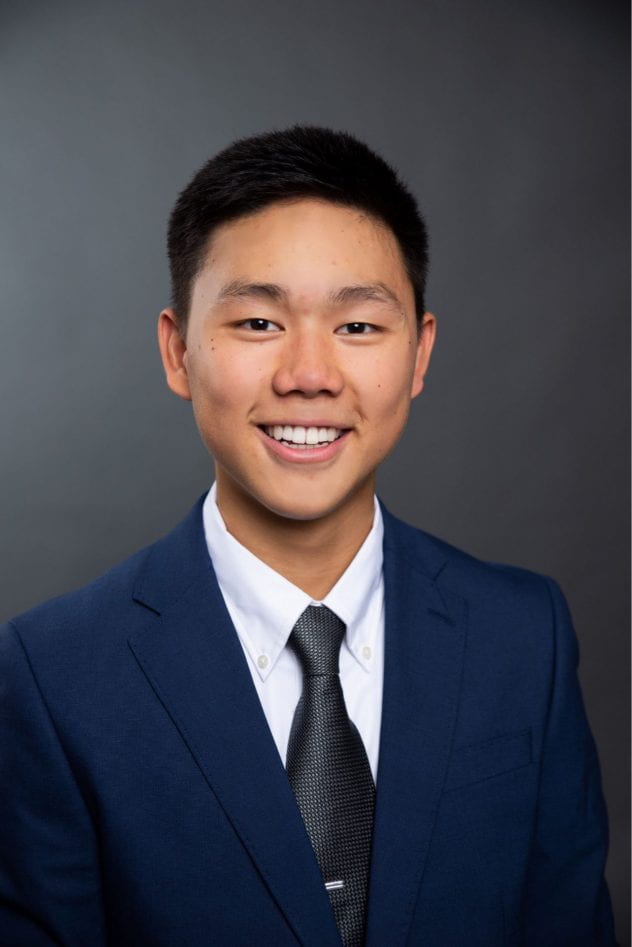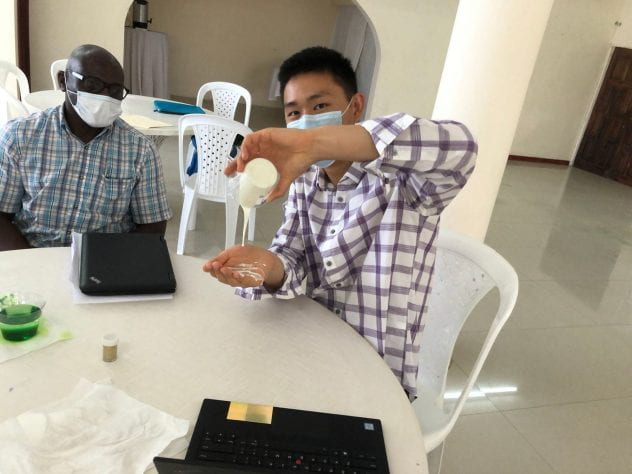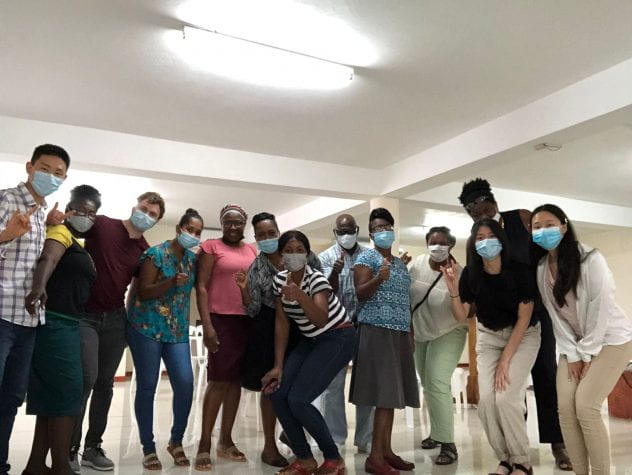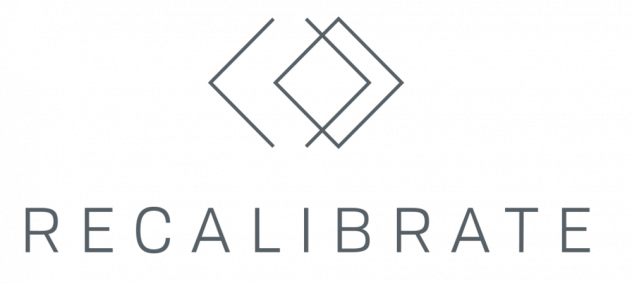
Anthony Tang
Topics of Interest: Recalibrate, mental health and well-being, data analytics, research, statistics, polls, science, applied learning, teaching, education
The sky’s the limit as they say. Canfield BHPers know this well because, in our program, students are free to explore several aspects of business, computer science, engineering, and more to fit their career plans and goals. Like Canfield BHPer, Anthony Tang, said in his interview with us recently, “You don’t have to do something for a career. The things that you do don’t have to meet some caliber or level. There are a lot of ways to explore your interests and you shouldn’t feel limited.” We couldn’t have said it better, Anthony.
Anthony Tang is a Canfield BHP senior studying biochemistry while obtaining certificates in Spanish and Statistical Modeling. An avid basketball fan and resident baller at “BHPballers”, Anthony is the example of a well-rounded student who embraces exploration and experience in ways that promote the best personal growth possible. Oh, and he’s also an awesome violinist and member of the Healing with Harmonies ensemble on campus!
We caught up with Anthony to hear about time he spent teaching science to elementary kids in Jamaica and heard about his experience as a Research and Data Analytics Intern at Recalibrate, a company owned by Canfield BHP alum Gloria Chan Packer (check out her spotlight here!). Read on to learn more about Anthony!

This past summer you traveled to Jamaica where you taught science to elementary students. What was that experience like for you?
Over the summer, I worked with a team of three undergrad students and one faculty mentor, with who I’ve been working since last summer. This project was about working with primary school teachers in Jamaica to build hands-on lessons for them to use in their science classrooms. This whole project was made possible through the UT President’s Award for Global Learning Program. We’re all passionate about science, education, and learning and during the pandemic, we realized how difficult it was to enjoy some of our science classes without being in the lab. For example, a physics lab online was a lot less entertaining than being in person and performing experiments like pushing carts and observing friction in front of our very eyes. Instead, we were in online simulations playing knockoff games trying to measure stuff.
Once we heard about this President’s Award program, we started to think, “What if there’s something we can do to push for more hands-on learning in science”? So we looked at different places abroad that were interested in a similar objective. Jamaica was the one place that we found that also spoke English and coincidentally, their Ministry of Education had launched a new curriculum for the country to push away from rote learning and memorization of concepts to more applied learning and hands-on stuff. Specifically, around the city area of Kingston, we learned that they were doing a great job keeping up with the new curriculum. But for most of the rural areas in West Jamaica, it seemed like a lot of the schools were missing the necessary resources to implement these experimental, hands-on learning experiences in their classrooms. So we started talking with an educational nonprofit in the Western Jamaica area who was interested in working with us, not only to provide materials but also because we provided a cool connection with UTeach at UT Austin. UTeach has already done a lot of great work in the local Austin area with hands-on learning but we wanted to make that unique bridge between our UTeach program and the educational nonprofit in Jamaica to start a collaboration to work and make science engaging and interesting for primary school students.

How can students get an internship like this in Jamaica?
One of the best things about being at UT is that it’s such a big university. There are resources for anything that you might be interested in. This goes back to why I chose Canfield BHP in the first place. Everyone in CBHP gets this tight-knit community, like family. We also get all the resources that a big university has to offer and I would encourage everyone to take advantage of it. This Jamaica opportunity was one way for me to explore outside of business, outside of medicine even. When I tell people I did this, people ask me if I’m interested in science or education, but I don’t necessarily want to be a teacher. On that note, one piece of advice I want to say is don’t think that everything you do has to be tied to a career. Honestly, if you’re just interested in some educational outreach or if you’re interested in beekeeping, for example, join a club and explore that. You don’t have to do something for a career. The things that you do don’t have to meet some caliber or level. There are a lot of ways to explore your interests and you shouldn’t feel limited.
You recently spent some time working an internship with a Canfield BHP alumni-owned organization called Recalibrate. What was your role and how was that experience?
Yes, in addition to my time in Jamaica this summer, I also worked an internship at Recalibrate owned by one of our alumni, Gloria Chan Packer, where I worked as their Research and Analytics Intern. Recalibrate focuses on mental wellness and meditation through workshops for employees from companies that are interested in improving the quality of the mental health aspect of their workplace. I helped design and build from scratch, a method to evaluate how effective our processes and services are through a polling system. I found a poll service that we ultimately are going to move forward with, and then developed prototypes of polls that are going to help us analyze the data we collect from them.
How did the experience you gain line up with what you want to do later in your career?
The experience was great because it aligned with my interests in statistics and data science as well as my interests in mental health and well-being. I just finished applying to medical school and I hope to be interviewed soon, but the type of doctor I want to be is one that spends time in the clinic as well as time doing research, more large-scale administration, or something to improve health equity. As a doctor, I’d like to improve resources such as mental health and well-being care for populations who have not previously had access to that and who may have exhibited some stigma around that. It’s important for me, as a future doctor, to learn more about mental health and how it can be diagnosed and identified as well as how we can best serve those needs in our patients.
What were some of your takeaways as a Research and Analytics Intern?
On the technical side, it’s important for companies to continuously collect data to understand their client base so they can better market and position themselves to a specific audience and cater to their needs. But I also recognize that, while mental health and well-being have traditionally felt like very elusive and nebulous topics, I found that there are hard and objective ways to measure them. Through the polls that I designed we ask questions like, “How confident do you feel about managing your stress at the end of this presentation? Or name one way that you’re going to think more positively about a certain area of your life.” By intentionally building hard ways and systems to address nebulous and intangible concepts like mental health and well-being, we can address what is very much a real problem while getting quantitative data about a qualitative subject.
What advice can you provide students interested in a similar path?
Coming into my freshman year, I felt some pressure to take the most rigorous classes or classes that everyone said would look good on a resume. There were several courses I felt pressure to take. Don’t do what I did. You should definitely take courses that you’re actually interested in because honestly, every course is standardized and difficult in some way. If you take a course that you don’t enjoy – no matter how easy it is – it’s going to be difficult.
For example, what I’ve done this semester is taken Spanish classes (outside of requirements) to learn more about it because I enjoy it. So by taking classes you enjoy, you can not only do well but also learn more about yourself and what other classes you might want to take. For freshmen (obviously, take your requirements but for your electives), take things that sound interesting to you. Don’t take them because you feel pressured, or on the other hand, don’t take them just because you heard it is an easy class because I personally don’t believe there’s such a thing as an easy class. There are classes you’ll like and classes you won’t.

